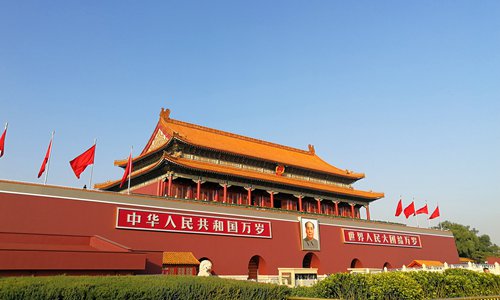HOME >> OPINION
China’s resolve to modernize governance
By Bao Chuanjian Source:Global Times Published: 2019/11/3 17:58:39

Photo: VCG
Since the founding of the People's Republic of China, the state transformation has been rather successful, and China is about to become a moderately prosperous society in the near future. Based on its cultural and resource endowments, China has carried out various institutional innovations, critically absorbed useful experiences from other countries and formed an effective state governance system with Chinese characteristics.
The world today is undergoing a major change not seen in 100 years. In the face of new situations and fresh challenges, governance is a conventional wisdom as countries, whether developed or developing, capitalist or socialist ones, take enhancing their governance capacity as a policy priority. It can be said that almost all of the outstanding problems facing the contemporary world are directly or indirectly related to governance system or governance capacity.
Together with governance reform under the leadership of the Communist Party of China (CPC), the socialist system with Chinese characteristics has generated an unprecedented development miracle, and China's economic achievement and social progress have advanced the theory and practice of state transformation and governance.
Being a major power that increasingly approaches the center of the world stage, China is committed to building a community with a shared future for mankind and playing a more important role in maintaining the multipolar world order and reforming global governance institutions. Many less-developed countries try to learn from the experiences of China's reform and opening-up.
As socialism with Chinese characteristics enters a new era, how can we further deepen reforms in an all-round way? The proposition of modernizing governance system and capacity has thus been brought forward.
The top-level design is well in place. The fourth plenary session of the 19th CPC Central Committee was held in Beijing from October 28 to 31. Its main agenda was to discuss the major issues of upholding and perfecting the socialist system with Chinese characteristics and advancing the modernization of the country's governance system and capacity, which is also the overall goal of comprehensively deepening reform raised up at the third plenary session of the 18th CPC Central Committee.
China's modernization efforts have made tremendous progress in the last seven decades, while the topic of the fourth plenary session shows the central government's determination to solve the problem of existing governance deficit.
For example, China's Gini coefficient is still at a high level, and people's livelihood remains to be further improved. Breakthroughs have been made in environmental pollution control, but air, water and soil pollution are still relatively serious in some areas.
Internationally, China's image of a responsible stakeholder is gaining wider recognition. However, China still suffers from what is called soft power deficit according to some international surveys.
To further improve China's governance system, policymakers need to be continuously creative in governance thinking, give full play to the enabling role of the government and social organizations, and stimulate the vitality of economic and social development.
As a governance revolution is unfolding in the age of rapid technological advances, professionalism is one of the priorities of governance reforms in many countries. Whether urban or rural governance, it is necessary to cultivate professional governance talent.
For example, China's service-oriented government construction has made remarkable progress, but on some indexes measuring governmental performance, China still ranks behind its developed counterparts. The "At Most One Visit" reform implemented by Zhejiang Province can provide an important reference for the next step of governance reforms. The reform aims at facilitating the completion of all administrative procedures companies and citizens may need within one center.
Think tanks and social science scholars should play a better role in utilizing intellectual expertise. For instance, the modernization of the governance system should not only be explicitly designed at the macro level but also measurable at the micro level. China lacks systematic national governance measurement indicators, and think tanks and other policy institutions can design and establish scientific governance performance indicators in areas of economic development, environmental and climate change, as well as security evaluation.
The latest CPC Central Committee Political Bureau meeting in late October pointed out that the overall goal of modernizing governance system and capacity is that modernization should be fully realized at the 100th anniversary of the founding of the People's Republic of China. With systemic governance, law-based governance, comprehensive governance, governance from the origin, China's efforts to better turn the institutional advantage into state governance efficiency are on the way.
The theory of governance modernization can provide new insight into institutional dividends for China's sustainable development, especially in terms of governance dividend. This requires that the governance participants be incentivized to carry out institutional innovation according to China's national conditions. China's governance modernization will also provide useful lessons for other developing and transitional countries in their governance reforms.
The author is an assistant professor at Central Compilation and Translation Bureau. opinion@globaltimes.com.cn
Posted in: VIEWPOINT